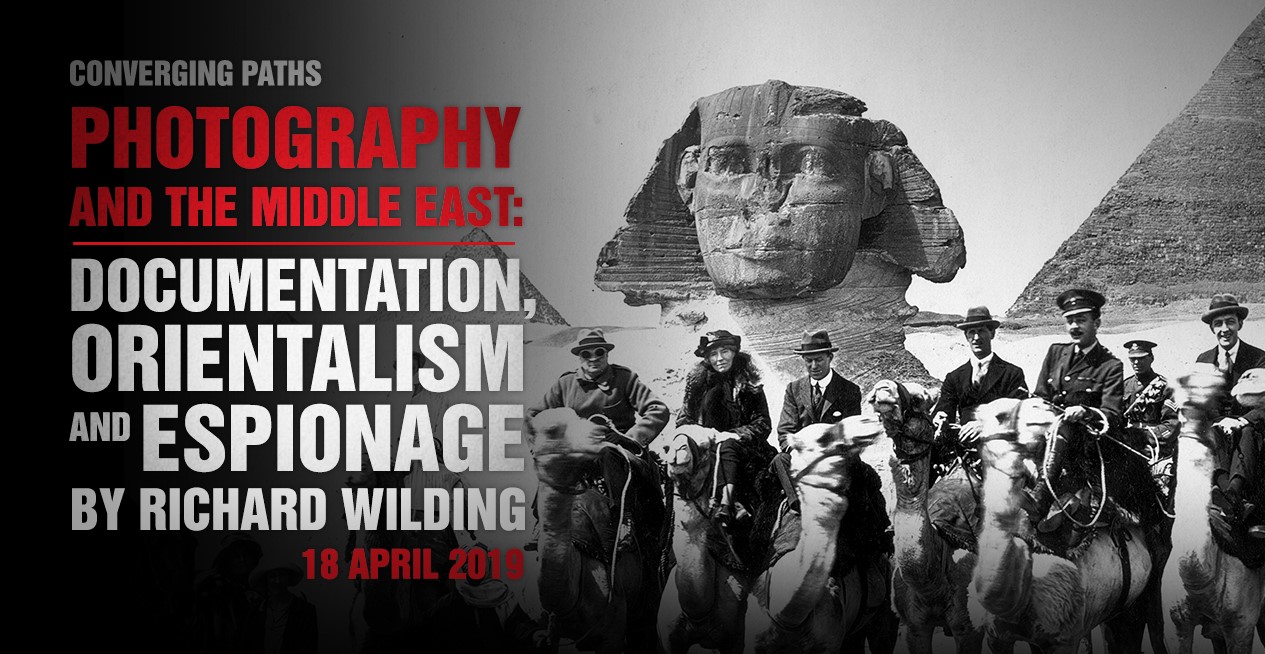Converging Paths: Photography and the Middle East: Documentation, Orientalism and Espionage
18 April '19 at 6:45 pm to 8:30 pm

Richard Wilding, co-curator of the exhibition ‘Departures’, is a photographer and film-maker specialising in the documentation of heritage and cultural identity in the Middle East. In this illustrated talk he contrasts the objectives and legacy of historical photographers with his own contemporary work in the region.
During the nineteenth century, exciting new archaeological discoveries in Egypt and Mesopotamia generated great enthusiasm in Europe for images and written accounts of the Orient. Following the invention of photography in 1839, the Middle East was the first region outside of Europe and the USA subjected to detailed photographic surveys of landscape, architecture and people.
Enterprising studio photographers such as Félix and Lydie Bonfils followed the traditions of Orientalist painting, creating staged and often highly exaggerated depictions of costume and lifestyles to satisfy European appetites for the exotic. Other photographers such as K.A.C. Creswell and Anthony Kersting documented the Middle East’s architecture and heritage in more factual and respectful surveys. Feted travellers such as Gertrude Bell, T.E Lawrence and Max von Oppenheim combined photography with a passion for archaeological discovery and covert diplomatic service for their respective countries.
Despite their varied styles and motives, these early photographers left a rich visual legacy, now held in institutions and private collections. Several large scale digitisation projects will make these images available for academic research, restoration teams and interested members of the public.
In his own work, Richard Wilding follows in the footsteps of these historical photographers, re-examining the original locations, subjects and objectives from a contemporary perspective. This also reveals the tragic loss of heritage and diversity to twentieth century modernity, sectarianism, war and displacement.
After his presentation, Richard Wilding will be joined by a panel of specialists in historical photography and heritage documentation to answer questions and participate in a lively debate with the audience.
Richard Wilding
Richard Wilding is a London-based photographer and filmmaker specialising in the documentation of cultural identity, heritage, archaeology and costume in the Middle East. He is currently working on long-term projects in Iraqi Kurdistan, Saudi Arabia and Egypt.
Wilding’s photography has been exhibited at the Houses of Parliament, Courtauld Institute of Art and University of Exeter in the UK and in Erbil and Sulaymaniyah in the Kurdistan region of Iraq. He has coordinated exhibitions of historical photography in Jeddah and Madinah, Saudi Arabia.
Wilding has given public talks at Leighton House Museum and the Ismaili Centre, London. He has given lectures for the Reconciliation and Peacebuilding programme at the University of Winchester, for the Department of Archaeology at the University of Reading, for the Sackler Research Forum at the Courtauld Institute of Art, London and at the University of Exeter’s Institute of Arab and Islamic Studies.
Since 2012, Richard Wilding has been Creative Director of Gulan, a UK registered charity which promotes the culture of Kurdistan. He is a trustee of the Mansoojat Foundation, a charity formed to collect and document the traditional costumes of Saudi Arabia.
Wilding is currently working with the Egyptian Heritage Rescue Foundation in Cairo on a pioneering project to film the conservation of medieval minbars in Cairo, using modern 3D printing technology to replicate fragments dispersed in museum collections and reinstate them in their original locations.
Organised by The Barakat Trust and Asia House Arts & Learning, in cooperation with The Courtauld Institute of Art and Newcastle University.
